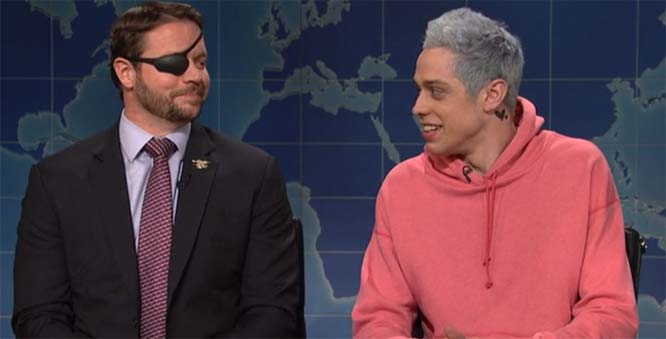
That's what made Pete Davidson's in-person apology to Dan Crenshaw, the former Navy SEAL and newly elected Republican representative from Texas's 2nd Congressional District, so notable. Davidson apologized Saturday for saying Crenshaw, who wears an eye patch after losing an eye in an IED explosion during his third tour in Afghanistan, looks like "a hit man from a porno movie."
The televised apology, in which Davidson called Crenshaw a "war hero," went viral, with people on both sides of the aisle praising the show for having Crenshaw on and the congressman-elect for accepting the invitation.
It was a unique moment for the show. Apologies from Lorne Michaels and crew might be exceedingly rare, but they do happen. It's just that they're usually not so straightforward, earnest and seemingly heartfelt.
Sometimes, the apology comes quickly, such as when actress Kristen Stewart accidentally cursed during her opening monologue in February 2017. Her hand immediately shot to her mouth. "I'm sorry!" she said. "I'll never be back."
And sometimes the show will offer a tongue-in-cheek half-apology, a wink at controversy if not an actually "sorry." Take Larry David, for example. The comic sparked outrage when he made jokes about dating in concentration camps during a monologue last year: "The problem is, there are no good opening lines in a concentration camp . . . 'How's it going? They treatin' you okay? You know, if we ever get out of here, I'd love to take you out for some latkes. You like latkes?'"
The blowback was immediate and intense. But the show didn't apologize during the next week's show - well, not exactly. Instead, David returned as Bernie Sanders in a fake ad for the Democratic National Committee. In it, David's Sanders said the party needed to crack down on political incorrectness, such as "these comics out there who think it's okay to make jokes about concentration camps. That guy should rot in hell."
Another strange half-apology came in 1992. Pop star and general malcontent Sinead O'Connor performed an a cappella version of Bob Marley's "War," though she changed some of the lyrics to address child abuse. She ended the song by tearing up a photo of Pope John Paul II and yelling, "Fight the real enemy."
The next week, actor Joe Pesci hosted the show - and he spent his monologue saying how "wrong" he found O'Connor's antics. Pesci said if it were his show, he would have given her "such a smack." At the end of his opening, he presented the photo, taped back together, to the audience.
If SNL's cast, crew or network truly feels the need to apologize for a joke, it generally happens off-screen.
In 2007, for example, SNL aired a sketch in which Bill Hader heard a song that reminds his character of his father, who has Down syndrome. "He loved this song," he said in the scene. "I remember we had this one great day at the park. We just had so much fun. He was running in the grass and chasing squirrels. They had this fountain and we threw pennies in it for hours. So great. It was the first day that I ever thought to myself: 'I have a dad. And not that I have a dad with Down syndrome. He loved crayons.'"
Members of the National Down Syndrome Society sent a letter to Michaels and NBC executives, requesting that NBC institute "a network policy that would prohibit and prevent the airing of programming with comments using Down syndrome or other intellectual disabilities as a punchline in the future."
Alan Wurtzel, then the executive responsible for the NBC Broadcast Standards and Practices Department, sent a personalized letter apologizing for the sketch.
"In the case of the sketch you expressed concerns about, in reviewing the tape in retrospect I believe we could have exercised greater sensitivity in that regard," he wrote. "Although the Down syndrome reference was a small part of a larger sketch that was intentionally outrageous and hyperbolic, it nonetheless could have been considered insensitive in its reference of individuals who, as you point out in your letter, continue to suffer from harmful stereotyping."
Another off-screen apology came in 1992, when Mike Myers and Dana Carvey did a version of "Wayne's World" that poked fun at Chelsea Clinton. After discussing Al Gore's daughters - "If they were a president, they'd be Babe-raham Lincoln" - Myers then focused on the then-12-year-old Clinton, calling her "a babe in development." He also said that "while it's true that adolescence has been thus far unkind, we think she's gonna be a future fox."
Myers later wrote a letter of apology to the Clintons, and the bit was edited out of rebroadcasts
"We felt, upon reflection, that if it was in any way hurtful, it wasn't worth it," Michaels said at the time. "She's a kid, a kid who didn't choose to be in public life."
It's telling SNL chose to offer Saturday what seemed like a sincere apology in this sharply divided political climate, though it may easily be a one-time mea culpa. By its own design, the show will undoubtedly offend someone again. Will on-air apologies become the norm? Probably not, but crazier things have happened.
(COMMENT, BELOW)


 Contact The Editor
Contact The Editor
 Articles By This Author
Articles By This Author